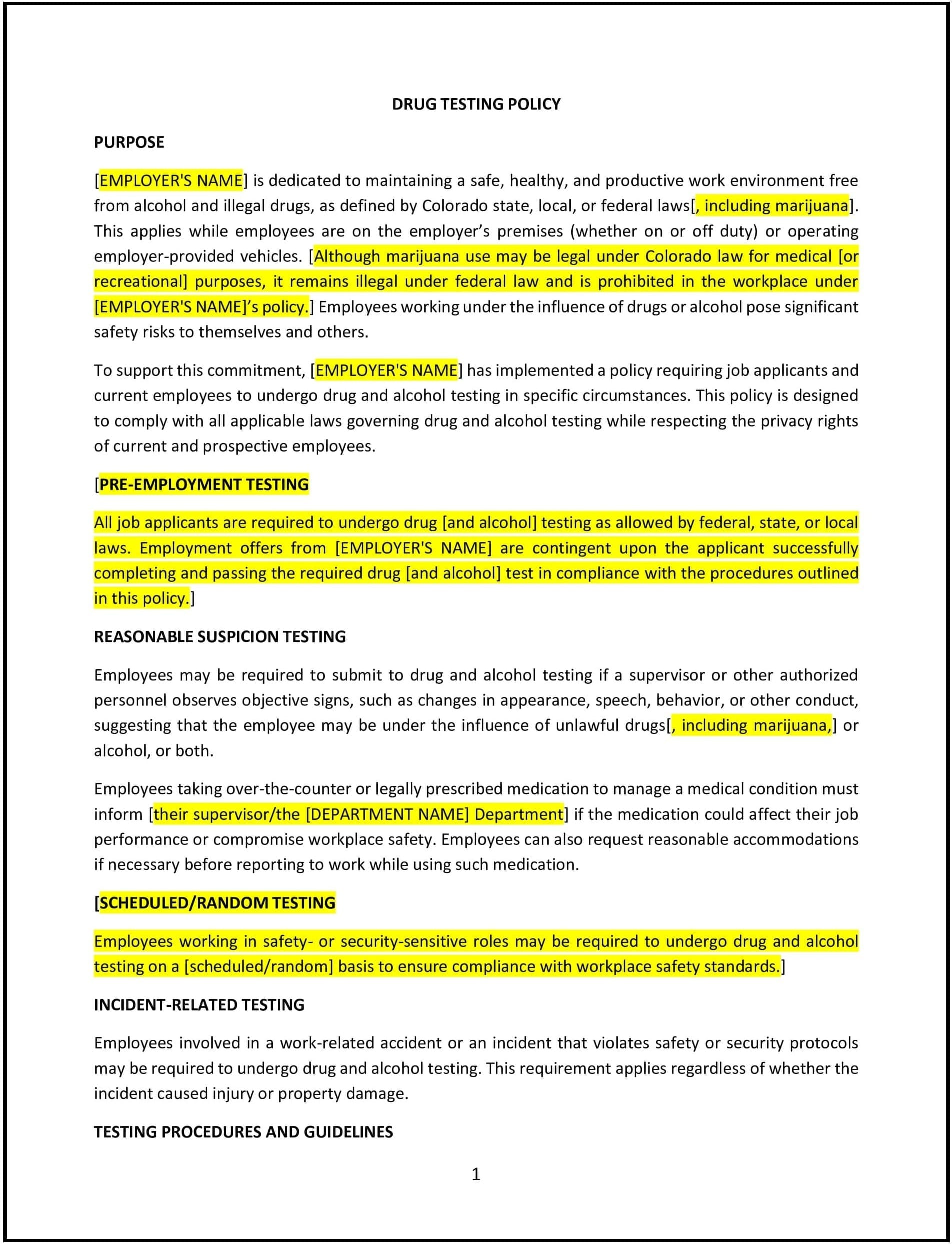Got contracts to review? While you're here for policies, let Cobrief make contract review effortless—start your free review now.

Customize this template for free
Drug testing policy (Colorado)
In Colorado, a drug testing policy provides businesses with guidelines for conducting drug tests on employees in accordance with state and federal regulations. This policy ensures that drug testing is carried out fairly, consistently, and in compliance with Colorado’s laws, including regulations on medical marijuana and employee privacy rights. The goal of this policy is to create a safe and productive work environment by addressing substance abuse issues while respecting employees' legal rights.
By implementing this policy, Colorado businesses can safeguard workplace safety, reduce the risk of accidents, and maintain productivity while ensuring compliance with the legal framework around drug use.
How to use this drug testing policy (Colorado)
- Define the scope of testing: Specify the types of drug tests that may be conducted, such as pre-employment testing, random drug testing, post-accident testing, or reasonable suspicion testing.
- Identify substances being tested: List the specific substances that will be tested for, including marijuana, alcohol, prescription drugs, and other controlled substances, and clarify how these substances are categorized under Colorado law.
- Outline testing procedures: Provide clear instructions on how drug tests will be administered, including the types of tests (e.g., urine, saliva, blood), and the process for employees to follow.
- Address medical marijuana use: Clearly state the business's stance on medical marijuana use, ensuring compliance with Colorado's medical marijuana laws while balancing workplace safety and productivity.
- Protect employee privacy: Ensure that testing procedures respect employee privacy rights, including the confidentiality of test results and the conditions under which information may be disclosed.
- Specify consequences of a positive test: Outline the consequences for employees who test positive, including disciplinary actions, mandatory counseling, or suspension, as well as potential reemployment procedures if the employee completes a rehabilitation program.
Benefits of using this drug testing policy (Colorado)
This policy offers several advantages for Colorado businesses:
- Supports compliance: Ensures adherence to Colorado’s drug testing regulations, including rules on medical marijuana, employee rights, and testing procedures.
- Promotes safety: Helps create a safer work environment by reducing the risks associated with substance abuse, particularly in safety-sensitive roles.
- Enhances productivity: By addressing drug use in the workplace, businesses can maintain productivity and reduce the risk of accidents or disruptions caused by substance abuse.
- Protects the business: Helps the business mitigate potential legal or liability risks related to workplace accidents or incidents caused by drug use.
- Supports a healthy work environment: Fosters a culture of responsibility and wellness by encouraging employees to maintain a drug-free workplace.
Tips for using this drug testing policy (Colorado)
- Reflect Colorado-specific laws: Ensure the policy is aligned with Colorado’s medical marijuana regulations, as well as state laws concerning employee rights to privacy and medical use of drugs.
- Communicate the policy clearly: Ensure that all employees are aware of the drug testing policy, the reasons for testing, and their rights under Colorado law.
- Be consistent: Apply the drug testing policy fairly across the organization, ensuring that all employees are subject to the same rules and testing procedures.
- Use professional testing services: Work with certified and accredited testing providers to ensure that tests are conducted fairly, accurately, and in compliance with the law.
- Review regularly: Periodically review and update the policy to ensure it remains compliant with changes in Colorado law or evolving business needs.